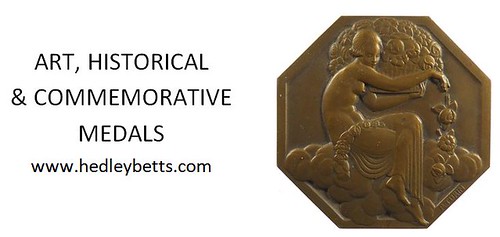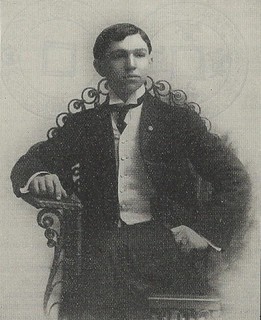
PREV ARTICLE
NEXT ARTICLE
FULL ISSUE
PREV FULL ISSUE
BENJAMIN MAXIMILLIAN MEHL (1884-1957)
John Lupia submitted the following information from his Encyclopedic Dictionary of Numismatic Biographies for this week's
installment of his series. Thanks! As always, this is an excerpt with the full article and bibliography available online. This week's
subject is dealer B. Max Mehl. -Editor
According to his brief biographical sketch in The Numismatist, March, 1905, page 89, his family moved to Vilkomir, Umerge district, province of Kovno (modern Kaunas), Lithuania, when he was an infant in 1885. This proved to be a bad move since there was an anti-Jewish riot there that year. Nevertheless, Ukmerge had been an important Judaic center in Lithuania for hundreds of years. The Hebrew school had been established there since 1868. A new building was constructed in the Autumn of 1884 for the Talmud Torah. It was in these schools that young B. Max Mehl learned reading, writing, Hebrew, Torah, translation, prayer interpretation, some Gemara, arithmetic and Russian. His family immigrated to America when he was ten years and five months old, in April 1895. Fort Worth, Texas, had established a Jewish Congregation in 1892, and in 1895 constructed a synagogue. Also in 1895, they established a Young Men's Hebrew Association. Sometime after November 5, 1897, B. Max Mehl celebrated his bar mitzvah at Fort Worth. From the time the Mehl family arrived the Jewish community at Fort Worth grew stronger and more organized. Numbered among the earlier Jewish settlers at Fort Worth were Nathaniel and Jacob Washer, who opened a men's clothing store in that city in 1882. When the Mehl family arrived at Fort Worth, Benjamin’s father Solomon opened a clothing store competing with the Washer Brothers. Benjamin began as a coin dealer from the coins that crossed his father’s counter in the clothing store and entered his collection rather than the cash register, certainly swapped by him with dad's approval in exchange for his weekly pay. He began coin dealing from his home at 1211 Main Street, Fort Worth, using it as an office in December 1903. Apparently he did not do well on this mail bid auction since he seems to be selling much of the same material in his January 25th 1904 circular cited in the Post Scriptum. His importance as a dealer was as a merchandizing promoter evidenced by his aggressive advertising, auctions, and publishing of several series of numismatic books and periodicals. The synergy he contributed to the coin industry during his fifty-two years as a coin dealer (1903-1955) occurred during a period of economic growth in the nation before, during, and after the depression that contributed to decidedly sharp market increases of closed sales prices on coins and paper money. 
Earliest known circular of B. Max Mehl, January 25, 1904. Courtesy Lupia Numismatic Library Mehl knew the power of promotion and used every opportunity at his disposal to promote himself as the world's foremost authority and highest respected coin dealer in America creating the fictional image that he was as big, powerful and grand as a government institution. Mehl knew how to touch the nerve of every treasure seeker since he knew amongst the struggling hard working general public people hoped they were lucky and possessed a rare coin worth a fortune that would solve life's problems. He advertised looking for 1913 Liberty Head Nickels when he knew none were available. But he got people curious going through jars of change looking to find a coin that could bring wealth to them, all for a buck, the price of his Star Rare Coin Encyclopedia. He capitalized on the same principle that made lotteries work since the colonial period : take a chance for a dollar, you just might have Lady Fortune smile on you. By 1929 he claimed he sold 1 million copies. Even if this were only half true he would already have amassed a small fortune by book sales alone. The power of persuasion made Mehl, a former shoe salesman, into a millionaire and captain of industry.
This is only the tiniest of excerpts - a wealth of great material on B. Max Mehl is available online at John Lupia's web site - be
sure to read the complete entry online. -Editor
To read the complete article, see:

Wayne Homren, Editor The Numismatic Bibliomania Society is a non-profit organization promoting numismatic literature. See our web site at coinbooks.org. To submit items for publication in The E-Sylum, write to the Editor at this address: whomren@gmail.com To subscribe go to: https://my.binhost.com/lists/listinfo/esylum All Rights Reserved. NBS Home Page Contact the NBS webmaster 
|
